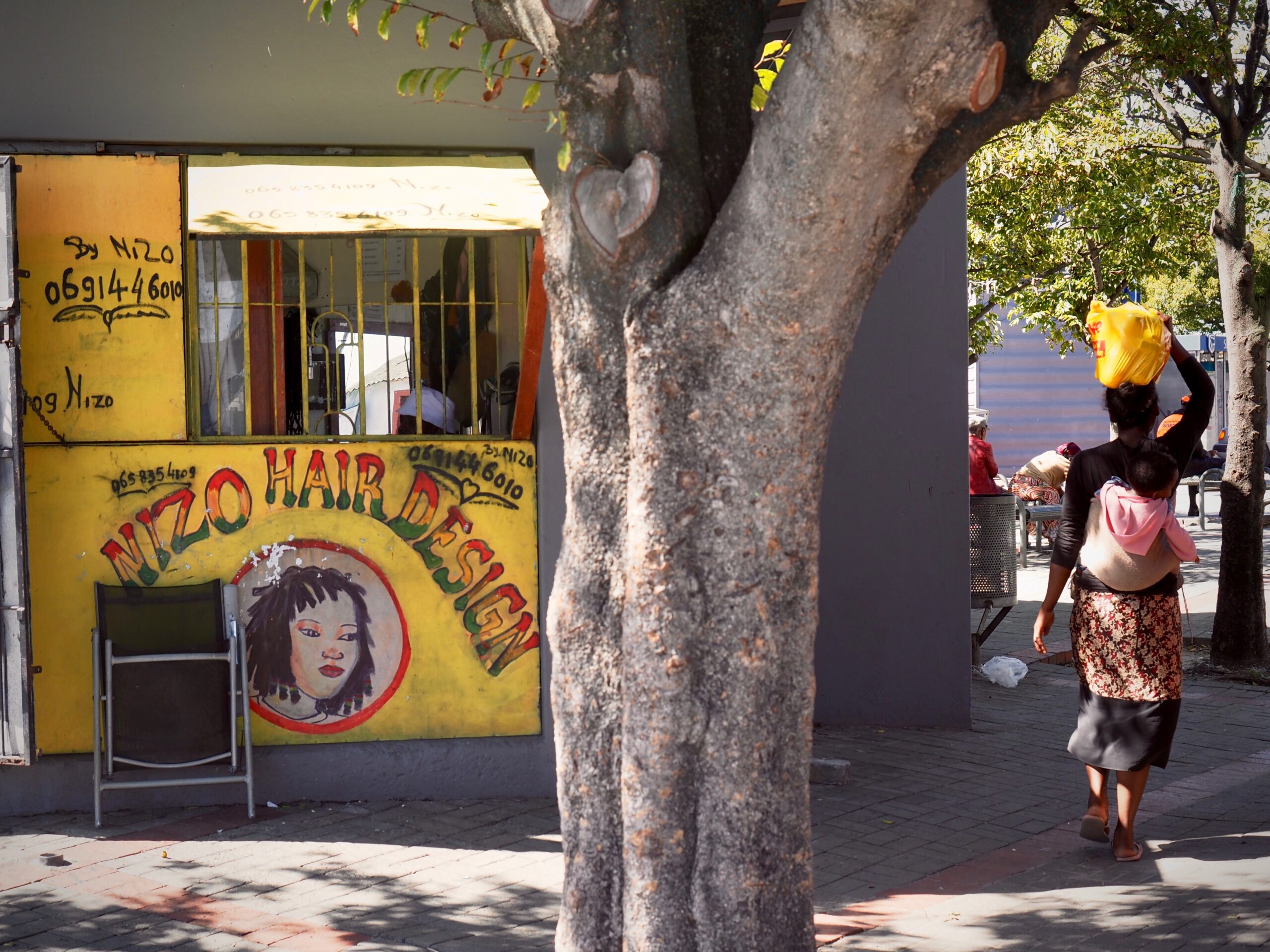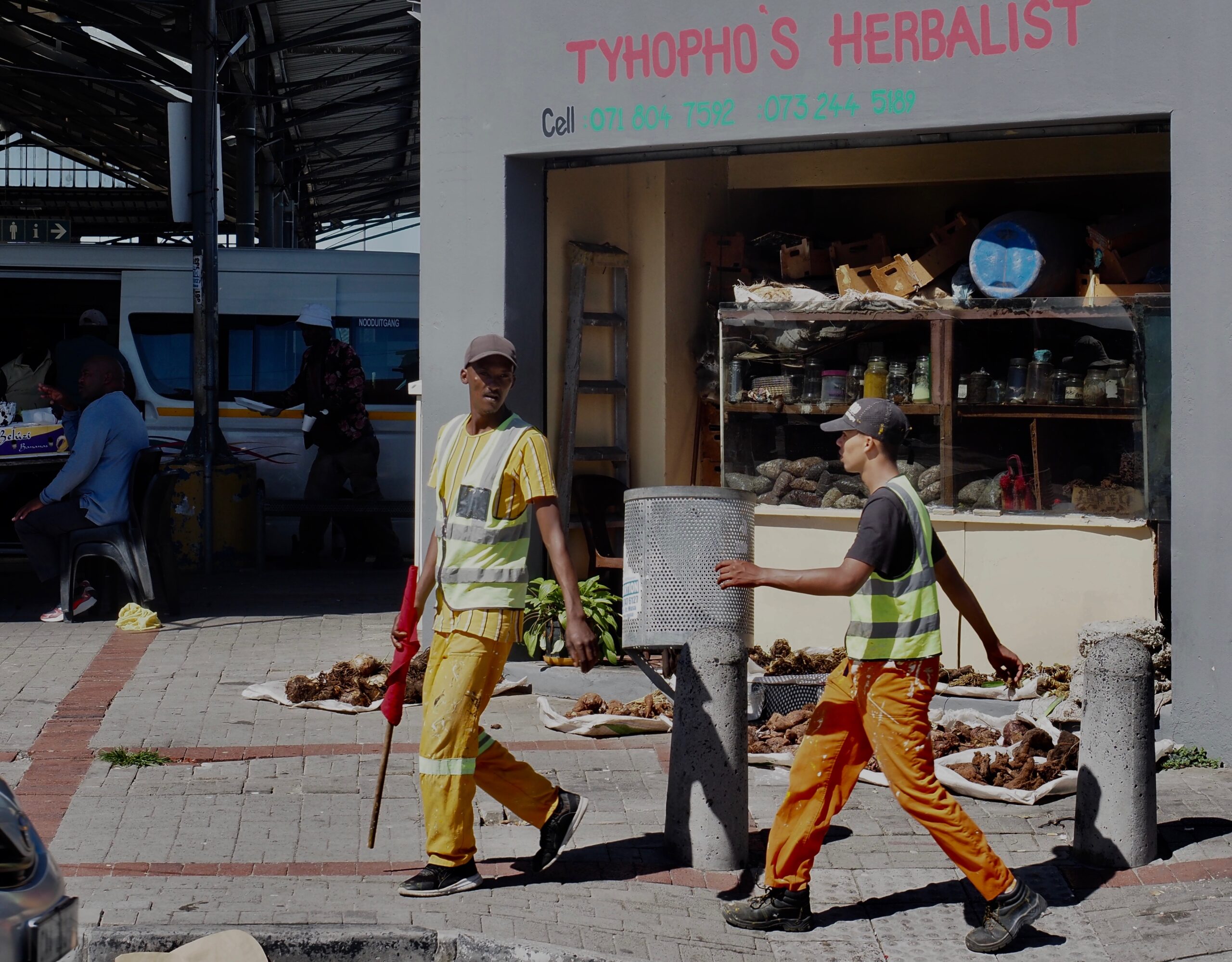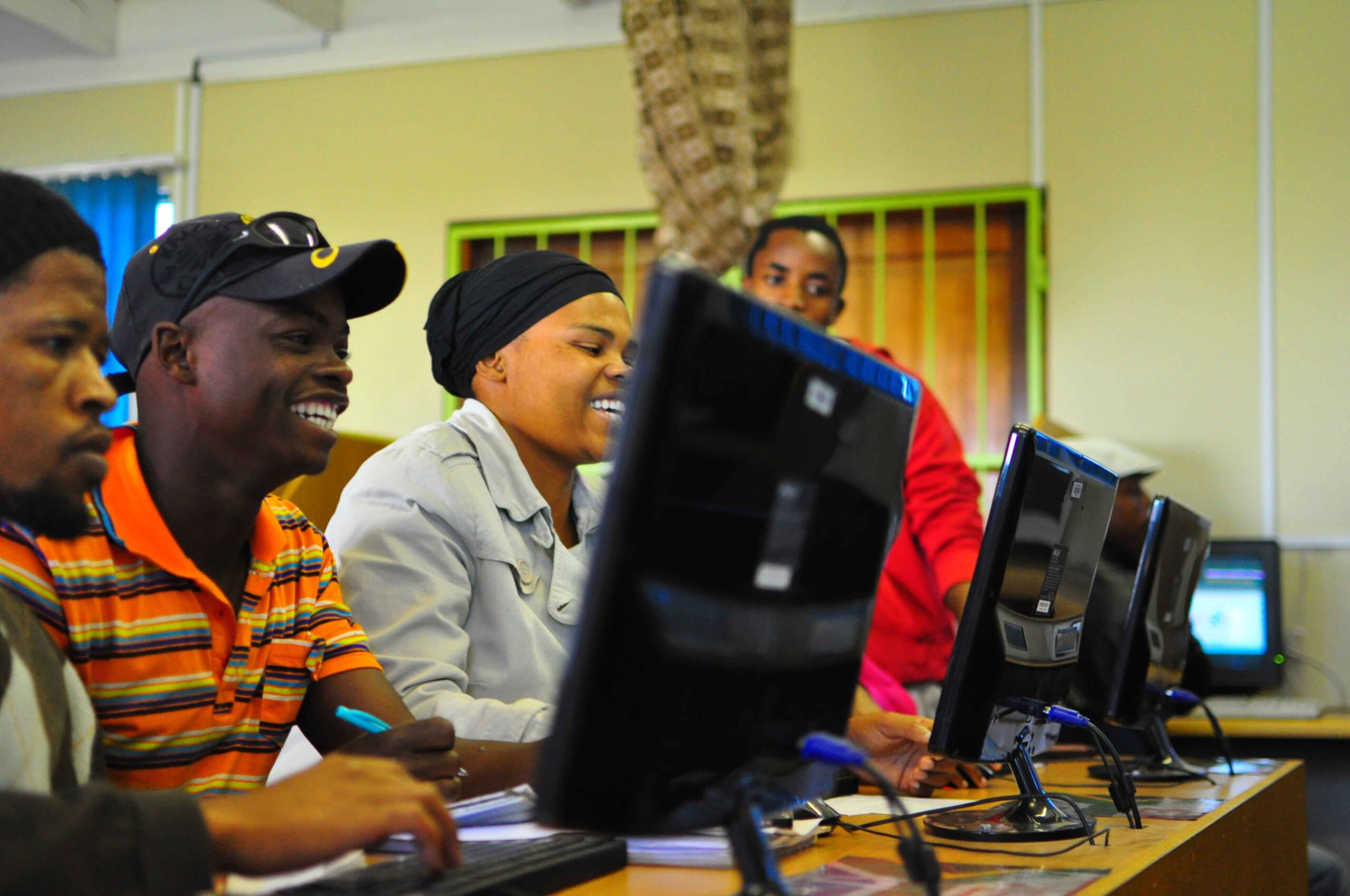In South Africa’s major cities, informal settlements are home to one in five residents. And, in 2021, the informal sector accounted for nearly one in three jobs, despite regulatory and other challenges. At a recent HSRC forum on informal sector innovation held in Philippi, Cape Town, speakers emphasised the need to recognise informality as a fundamental feature of our cities. At an accompanying workshop, HSRC researchers worked with informal sector stakeholders to refine a new evidence-based toolkit that aims to assist informal businesses in becoming sustainable. By Andrea Teagle

A woman walks past a hair salon in Langa, Cape Town, March 2023. Photo: Andrea Teagle
At a recent forum on informal sector innovation, which took place in Philippi Village, Cape Town, informal business owners from Philippi and its surrounds shared their experiences and the challenges they have been facing.
Calling for developmental by-laws, Rosheda Muller, an informal trader and president of the Informal Economy Development Forum, decried “the draconian by-laws” imposed by the City of Cape Town and other municipalities. An informal clothing manufacturer shared how lost productivity due to load-shedding had meant that she had sometimes had to wake up at 2:00 at night to “try and make up for that shortfall”. Participants also spoke of a lack of physical infrastructure to protect goods from poor weather, limited resources and crime.
Despite such obstacles, informal business owners across the country have found ways to innovate and sustain their enterprises. An HSRC survey conducted in Sweetwaters, KwaZulu-Natal, revealed that 67% of informal business owners engaged in innovation activities to adapt to external conditions and to remain competitive. In a recent policy brief, the HSRC’s Nazeem Mustapha and his colleagues highlight the importance of incremental innovation to an informal business’s survival. ‘Innovations in the informal sector are a bricolage where resources are constrained, providing practical solutions to everyday problems,’ they write.
At the forum in Philippi, economist Prof. Erika Kraemer-Mbula spoke about how digital technologies – such as social media platforms and mobile device payment technologies – have enhanced the capacity of informal businesses to adapt to new circumstances. To “enhance digital readiness” and uptake of technologies, interaction with formal businesses should be promoted, added Dr Elvis Avenyo, also from the University of Johannesburg.
Through their research with informal business owners, HSRC researchers have identified factors associated with sustainable and innovative informal businesses. Based on these findings, Il-haam Petersen and her research team developed an online toolkit to assist informal traders in becoming sustainable enterprises. In May 2023, the HSRC presented the toolkit to informal sector stakeholders at the Philippi forum. The event also featured a dialogue on how to build capabilities in local informal enterprises, with participation from researchers and policymakers in the fields of development, urban development, innovation, and education and training.
The innovation toolkit
With isiXhosa translations provided by the HSRC’s Mbongeni Masizya, Il-haam Petersen and colleague Nicole van Rheede described the purpose of the toolkit and demonstrated how to use one of its tools. Among the participants of the toolkit workshop were clothing and food vendors, car wash service providers, spaza shop owners and an arts-and-crafts training facilitator.
“The tool is for you to understand your business, where you want to be and what steps you want to take. How do you build capacity to be able to become financially viable and sustainable, a company that makes a profit [and] that grows?” Van Rheede said.
Users begin by completing a questionnaire designed to ascertain their goals and current business capacity. For instance, ‘Does your business operate from fixed premises?’ ‘Would you like it to operate from fixed premises in future?’ ‘Have you ever received funding?’ and ‘Would you like to receive funding?’ The toolkit then suggests practical, customised steps that business owners can take to build capacity in a particular direction.
While the toolkit provides information about why a business owner might want to formalise – for instance, to access funding – it is not the goal; it is rather a means of becoming sustainable. Petersen emphasised that it was up to the traders to decide whether taking steps towards becoming a formal enterprise made sense for them. During the workshop, the participants also provided valuable feedback, including a suggestion to include more information regarding tax and how it applies to small business owners who earn under a certain amount.
According to Petersen, the HSRC team plans to conduct more engagements with informal sector stakeholders and to further develop the toolkit by incorporating suggestions and feedback. “Once completed, the toolkit will be made available to informal businesses and their support organisations,” she added.

A herbalist’s shop in Langa, Cape Town, March 2023. Photo: Andrea Teagle
Changing mindsets around informality
While the tool focused on factors within the control of informal traders, empowering informal business owners extends beyond building individual capacity. In a separate session at the forum, speakers emphasised the need to shift policy and to change how informality is viewed in the country.
Prof. Edgar Pieterse from UCT’s Centre for African Cities argued that we need to start recognising informal settlements as a central part of urban South Africa, and the informal economy as an important part of the economy. As sub-Saharan Africa becomes increasingly urbanised, most of the growth will be informal.
Yet, informal settlements continue to be viewed as fringe areas that receive little investment. Similarly, the idea that only the formal economy is valid means that informal activities are not only unsupported but are actively penalised. He added that this lies in the DNA level of our policies and regulations.
“There’s an assumption that to be developed takes a certain form: that [it] looks like a certain kind of firm, like a certain kind of retail, like a certain way of life, a suburb with modern infrastructure, modern transport and so on. And often there is this gap between that reality and what is really happening on the ground – and that gap speaks to failure of imagination.”
He argued that the phenomenon of smart cities in South Africa and elsewhere in Africa reflected a fixation with modernisation at all costs. Such developments may look impressive on paper but often fail to benefit the majority of the population. They also divert funds from improving conditions in existing townships and inner-city precincts. HSRC research suggests that supporting backyard rental development and allowing for mixed-use areas can spur economic development and improve living conditions in low-income neighbourhoods.
Pieterse argued for precinct-level, integrated and incremental approaches to upgrading informal settlements, with the goal of progressively transforming these areas into sustainable neighbourhoods. He suggested that the confluence of artificial intelligence and new green technologies and knowledge provided a unique opportunity to rethink urban development in a way that centralised informality. However, this would require radical shifts in regulations, planning, and zoning.
“The reason why money gets spent in a certain way, or things get evaluated in a certain way, is…the regulation. So can we build different logics for what we regulate and how it gets regulated?” The Sustainable Livelihoods Foundation’s Dr Andrew Charman added that although public spaces such as parks are “critical to the growth of entrepreneurship”, in South Africa, these spaces are the “most restricted” and highly regulated spaces.
How can regulation enable new imaginaries for informality and urban development? Stephen Umlaw of the Department of Small Business Development described how the National Informal Business Upliftment Strategy, as an “innovation in policy”, was “developed alongside the informal economy” to enable innovation and transformation.
DSI to support innovation-enhancing initiatives
Just as development approaches often neglect informal settlements, formal education is aimed at meeting the needs of the formal economy, said Prof. Lesley Powell of the School of Education at the University of Cape Town. “Informality has the capacity to channel entrepreneurial energy that creates employment and incomes for large portions of the population…,” she said. Yet, there is limited understanding of the types of support that are needed to nurture entrepreneurship in the informal sector. For instance, traditional entrepreneur training programmes are often targeted at individuals and teach the same set of skills across the board, focusing on generic traits like resilience. According to Powell, however, in many instances, successful informal businesses in sub-Saharan Africa are run by collectives, like families – and the necessary skills differ by industry. Work by the HSRC’s Adam Cooper has shown that social connectedness is a powerful ingredient of successful informal sector start-ups in South Africa.
Imraan Patel, a deputy director-general of the Department of Science and Innovation (DSI) said the DSI would support new research on training and support for the informal sector and would facilitate the inclusion of this research in policy discussions. He added that the DSI would work to co-ordinate and enhance existing initiatives aimed at strengthening innovation in the informal sector.
The HSRC hosted the ‘Forum on building capabilities for innovation and learning in South African informal enterprises’ in partnership with the Informal Economy Development Forum and The Safety Lab. You can watch the three-part recordings here, here and here.
Researcher contacts:
Dr Il-haam Petersen, a chief research specialist, and Nicole van Rheede, a chief researcher in the HSRC’s Centre for Science, Technology and Innovation Indicators (CeSTII)


